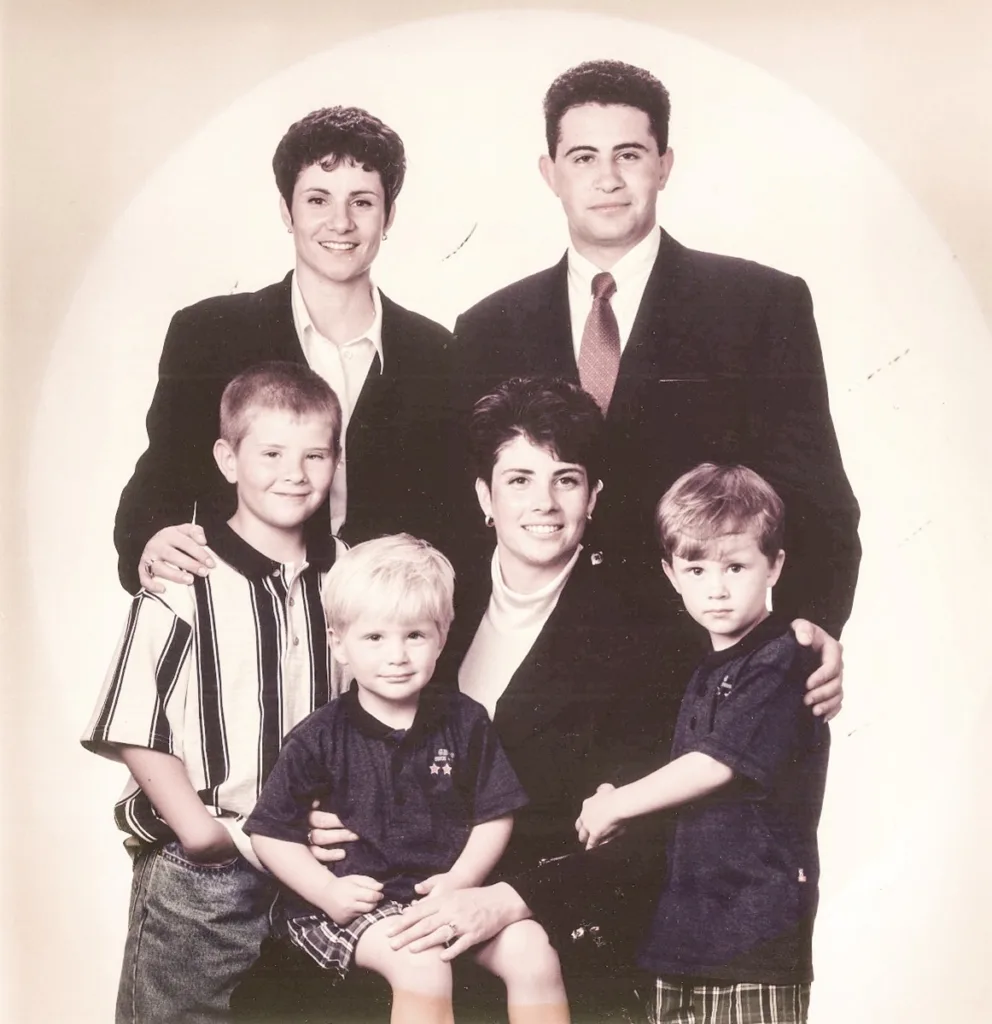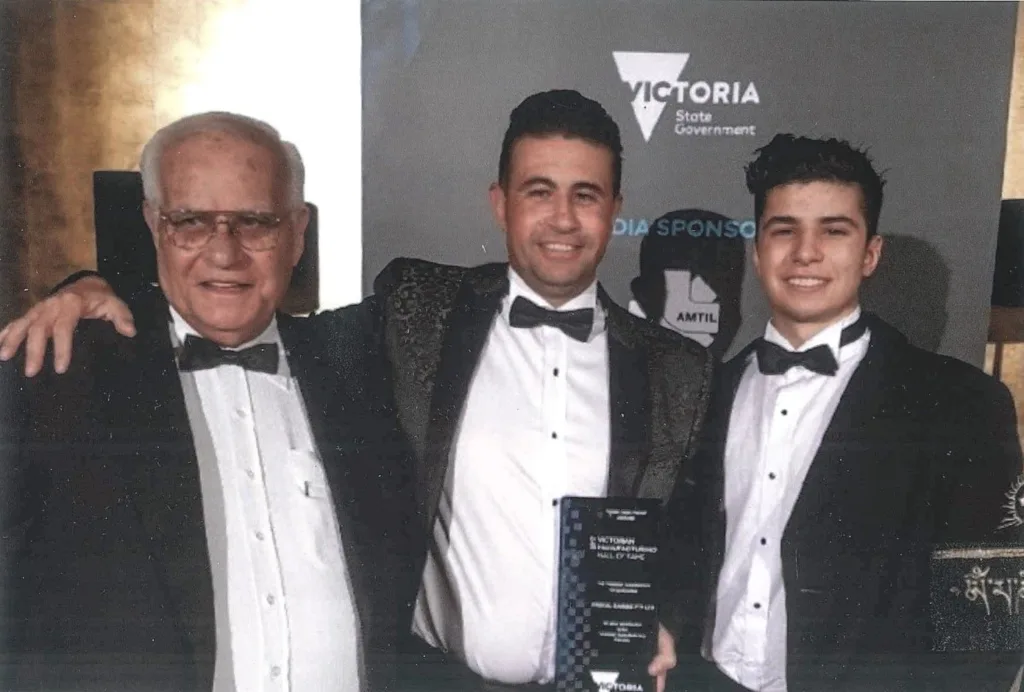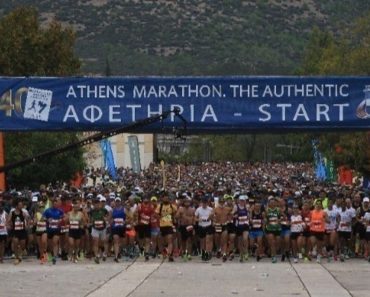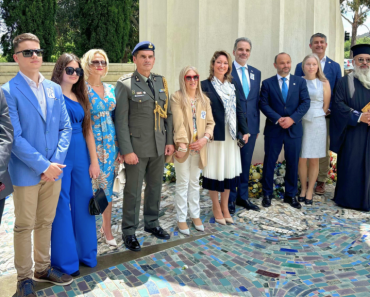The book entitled Nick Thyssen: The Story of a Great Innovator to Remember written by Professor Anastasios M. Tamis, which refers to the life and achievements of one of the most innovative Greeks of the Hellenic Diaspora, will be launched at the Ballroom LOGO Building of the Panarcadian Association of Melbourne, on Wednesday, 27 November 2024, at 6.30pm.
The event will be presented by the well-known TV presenter and journalist, John Mangos, while the book will be launched by the former Premier of Victoria and a Philhellene, Jeff Kennett AC. This significant event is sponsored by Procal Dairies, AIMS and the Panarcadian Association of Melbourne and Victoria.
The narration of the biography of Nikolaos Theodosiadis [Nick Thyssen], does not aim simply to focus on the experiences he formed during his life, outlining specific aspects of his most successful and meteoric industrial career. This book highlights the life and contribution of one of the most innovative entrepreneurs in Australia and beyond, emphasising on the personality, talent, genius, charismatic ingenuity and contribution that Nick Thyssen has attributed to the history and evolution of the national and global food industry.
His historical biography is analysed and moves in parallel with the historical events and historical-political developments that marked Greece and Australia, as a country of origin and as a host country, as well as with the evolution of the dominant society, but also of Hellenism.
Certainly, all immigrants who sought protection in emigration, uprooted by their relatives, have experienced their own history, achievements, and trials, which deserve to be preserved by their descendants. However, some pioneer settlers emerged in the Greek Diaspora as model figures and enriched the wider society with their contribution.
In the case of Nick Thyssen, we have one of the most inventive figures of the Hellenic Diaspora, a symbol of the ingenious businessman with innovative ideas and novel conceptions who radically and profoundly revolutionised certain sections of the global food industry.
A farm boy from Valimitika, Aigialeia, with twenty pounds of pocket money from his brother upon settlement, and with the unfailing support of his wife, Maureen, for more than sixty years, he caused a global revolution in the production of natural citrus and vegetable juices without additives, fresh fruit salads and soups, when until then the global food industry was relying on cooked preserved tinned compotes and canned concentrated juices and foods.

Despite the abundance of publications referring to people of Anglo-Celtic or non-Anglo-Celtic origin in Australia, there are hundreds of personalities with enormous contributions who remain still unknown or are in question. There are also many Australians of non-Anglo-Celtic descent whose significant contribution will unfortunately never be highlighted. In the demographically powerful Greek Australian community of more than 530,000 Greeks, with its innumerable national-ecclesiastical and socio-economic bodies, with more than 1,200 legally registered community organisations that cover their sporting, social, political, economic, and cultural needs, there are many Greeks who played a very important role, but their names and contribution have not been recorded. The multifarious achievements, triumphs, sufferings, and tragedies that marked their lives will never be made public. Many of these migrants were unable to even write to their relatives in Greece or in Cyprus, so their fate is the subject of vague speculation. Many Greeks excelled as skilled manual workers, successful merchants and entrepreneurs, industrialists, or important scientists.
The most important thing about Nick Thyssen’s activity and triumphant development is that this industrialist did not achieve greatness by copying others, he was not led to the triumph of success, having imitated the success of others. Most importantly, he never walked in the footsteps and paths that others thought or others tried first and succeeded. Nick Thyssen is the only one, the authentic, the unique, the innovator, the inventive, the man who thought, orchestrated and implemented his own ideas, his own machines, his own inventions and reached success with struggles, often with great monetary losses. For Nick Thyssen’s talent is over and above static labels of envy such as: “others helped you”, “he inherited the wealth of his parents”, “he found it from his uncle”, “you have done what Thanasis and Kostas did”. There could not be labels for Nick Thyssen, no copying tactics.
The next impressive thing about Nick Thyssen is that money and profit making was not an end in itself for him, that is, he did not work just to earn wealth. He worked for the success of his ideas, struggled to taste the joy of having ventured into the new idea, and was successful. He often confessed that he lost a lot of money with his bold and innovative ideas, with his improvisations. The great thing is that Nick Thyssen never felt sorry for the money he lost. But he was saddened and hurt when his goal and objectives did not succeed. That is why he always advised: “Do not stop, do not be timid, when you lose. You have to get back up, get back up, feel strong even when you lose.”
Nick Thyssen will go down in the history of the Australian juice and food industry because he founded, organized, developed and popularized both in Australia and the rest of the world, for the first time, the industrialization of natural citrus juice. He was also the man who invented and enriched the markets with fresh fruit salad and soup varieties in special cardboard boxes that ensured longevity. The products of the companies he created from the famous and historic Patra Orange Juice, Original Juice Company, Ready Cut Company, Easy Cheff, Procal and at least twenty other companies through which he attempted his innovative program, diachronically, are being displayed in the showcases of supermarkets, covering the needs of hospitals, army and sports infrastructure.
The huge but less-noticed contribution of Nick Thyssen is that with his innovative ideas he improved the everyday life of the citizen. He gave the opportunity to thousands of citizens every day to enjoy a natural juice and not canned juice during a break at work, talking with their colleagues, or enjoying a fresh fruit salad for their lunch, or resorting to a soup for their dinner. Not canned conserved soups, but freshly cooked soups in hospitals and barracks and, of course, in their households. No matter how simple these may seem today, after their successful outcome, such simple movements enriched and enhanced our daily lives.

An excerpt from the book
The book about the story of Nick Thyssen, which will be presented next month, does not exclusively highlight his successes and achievements. The book refers to his origins, to the wretched land of his parents and ancestors, commemorating the sacrifices of his forebearers and his people, before discovering Australia. Here’s a small example, below, describing the stone years of war, as well as civil war, before he took the road of expatriation in 1951 at the tender age of sixteen:
Tenacity of purpose characterised those who were compelled to survive the difficult war years. Viticulture and raisin production have been since Homeric times the ‘black gold’ for Greece in general and especially for the coastal northern Peloponnese from Corinth to Aigio. Especially in the period 1850-1950, hundreds of thousands of acres stretched on either side of the public road leading from Corinth to Aigio. In Valimitika, dozens of merchants’ delegations as well as brokers of producers of black currants operated in the summer, and in the four or five impressive factories-warehouses, hundreds of unskilled labourers found work and maintained the livelihood of their families. They picked the grapes, which were then stored, processed, and shipped abroad, mainly to central Europe, America, and Australia as late as 1910s. Many immigrants flocked from Arcadia, Argos, and inner Achaia to work on the vineyards and the harvesting of grapes. The workers in Valimitika, locals and immigrants, immediately after the harvest in the vineyards, used to undertake the harvest of oranges and lemons, at least until late autumn, before winter set in. The ancestors of Nick Theodossiadis, his great-grandparents Dimitrellos and Maria, and later his grandfather Constantinos and grandmother Evanthia, even his mother and Nick himself, also worked in these vineyards and raisin processing factories until the eve of his exit to Australia in 1951. Nick, as a school student, could recall that they worked there, in Valimitika, triple shifts to save on winter expenses, to educate their children who studied at the secondary schools of Kalavryta, Akratas, Aigio and Patras and later to support their university studies in Athens. Nick’s experience from the years he had followed his mother to the fields is revealing:
“I was not even five years old when I started working in the fields next to my mother. We gathered the raisins in coffins, like mamma hen and chicks. We dipped the grapes in lye (alisiva) (boiled ashy water) to shrink the berries and cut them off from their bunches and spread them on the threshing floor of our vineyard, to dry under the sun. Corinthian currants were worldwide popular. Our raisins were sold by our mother to merchants in the area, who had their warehouses in the village. There it was packed in wooden crates, carefully and diligently, before being transported on trains to Germany. Then came the raisin crisis. We put vineyards for table grapes. We also had the large vegetable garden in front of our house, which was protected by a wire fence supported by olive branches. Orange and lemon trees followed in our home garden. My mother and I planted thirty-six lemon trees. We had apple and pear trees. On Saturdays, my mother and I would go to the popular market in Aigio and sell our fruits and vegetables, green beans, artichokes, and beets. The bazaar was my first trading experience.
In November 1940, we were picking our olives with my mother, when my late uncle Charalambos visited us. He had married my father’s sister. We had eight roots. We would shake the branches, and the fruit would fall on the blankets. It was sunshine, clear skies and noon was approaching. Suddenly, the silence was interrupted by thunder coming from afar. At mother’s amazement my uncle exclaimed “The Italians are bombing Patras.” My mother crossed herself, gathered her apron and wiped her forehead. “May God and the Holy One protect us,” she uttered and remade her cross. I was in awe as a child. My fear was balanced by the love of my mother, whom I had a weakness for, even though not a day went by that she did not beat me to become a good person. This is the first thing I remember from my childhood. The voice of war.
We had to deal with two horrible things, poverty, and war. People had no money. Earlier, in 1932, my father lost most of the wealth he had brought from Alexandria. Greece declared its last bankruptcy. Unemployment everywhere. Some eight years later, the Italo-German occupation fell on our heads. Then came hunger, the complete destruction of Greece’s economy, the annihilation of the drachma’s purchasing power and hyperinflation. Fortunes were destroyed and people’s savings were wiped out. Many rich people committed suicide; others experienced serious psychiatric problems. Pain and suffering everywhere. Even in our village. I was an eight-year-old child, enduring the devastation.
Many migrants from the central Peloponnese roamed around, particularly from Arcadia, looking for work for a plate of food. We lacked bread, wheat, and oil. Hunger began. Life was done by exchanging products, eggs, raisins, milk, cheese, and vegetables. Everything every household had. The Italians came first. They did nothing hostile. Most of them felt both guilt and shame for what they had experienced from the Greeks in Pindos. We had no money for necessities, nor for oil for our lighting. The schools were closed until 1944. The only generator of our village was owned by a Theodossiadis. He, too, ran out of money and oil. That Sunday, after the bombing, my mother dressed us in our festive clothes and took us to Agios Vassilios. There was a liturgy by Father Spilios under the chorus of five-six hunched cantors, led by our chief cantor, always on the right psalter, Vasilis Anastasopoulos. Suddenly the lights went out. The generator no longer had oil. The dull light was now projected from the candles, projecting the shadows of the faithful on the walls. With the war everything went dark. Sad, aching and hungry were the faces of all grown-ups. That is how I remember them. People could not pay for petrol; they borrowed without repaying. I remember my wretched mother coming home from the nearest forest loaded with wood on her back to warm us. To bake in the fireplace the frumenty, a type of porridge, a thick boiled grain dish, which she had made almost two years ago. To feed our hunger. When our mother was in the orchards, my older sister, Anna, took care of the house and looked after us and our younger sister, Panagiota.
The war marked my childhood. I saw the savage face of war when I was seven. Our village was a supply center for the patriot rebels of Greek resistance. The rebels often descended from Helmos and took supplies. They had a young and enthusiastic leader, captain Korovotas, as their liaison. In the summer of 1942, my sisters and I took refuge in our family home, in ‘Pera Meria’ in Valimi, to rest mother. One morning, we noticed great mobility in our village. The Germans had come on their horses and surrounded our small square. After setting fire to and burning down the school, they arrested Korovotas for questioning. He was held prisoner in the community’s head office. He was a tall and broad-haired patriot and a good family person. In the afternoon he was dragged by two soldiers from the low house and placed under the tree. He was almost a rag. Folded and beaten mercilessly. They were preparing him for hanging in the square. He had refused to reveal the positions of our rebels, having been betrayed by one of our own to the Germans. They hung him in the square before our eyes, to be an example for all. I had never forgotten this evil. I later learned that the daughter of the German collaborator revealed her traitorous father to the rebels. Our people descended from the mountains and executed him on the same day.







